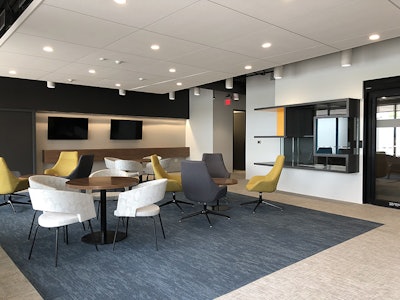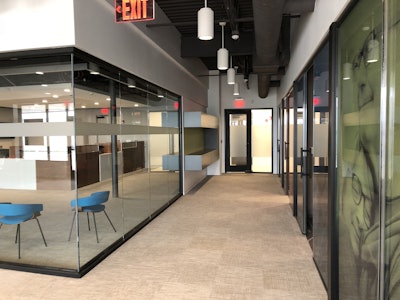
When PharmaCann relocated its suburban Chicago dispensary from Schaumberg to Arlington Heights, Ill., the move signified more than just a change of address. Under a new brand, Verilife, the company’s flagship store is the fulfillment of many lessons learned in the rapidly evolving, modern medical markets of the Eastern U.S.
“Verilife, for us, is very much the culmination of that exploration over of the last several years to understand what patients in the Eastern states expect and what policymkaers expect from their medical cannabis programs,” Jeremy Unruh, PharmaCann’s director of public and regulatory affairs, tells Cannabis Dispensary. “We think that it is a patient-based experience that's open, that's friendly, that's as aesthetically pleasing to a 78-year-old with Parkinson's as it is to a 30-year-old who may be treating a chronic pain condition. Verilife for us is about finding the truth in cannabis and doing it in a transparent way that people are comfortable with.”
It's not for nothing that the root of the brand name is found in the Latin “veri,” meaning “truth.”
The new store opened in late June to much fanfare. “We’re changing the way people see dispensaries,” CEO Teddy Scott said at the ribbon-cutting in Arlington Heights. “Its interior visibility and open-concept design emphasizes that medical cannabis is a legitimate and important medical option for patients.”

For PharmaCann, this retail rebranding moment is a hard-won milestone that could only have come after careful consideration of an industry that moves faster than almost any other in the country. Early on, Unruh says, the team “didn't want to sink a lot of time and effort into trying to read the tea leaves of that or trying to predict the future. Instead, we did the best we could, given what we had at the time. We let the market develop. Over the last year several months … we focused on what we thought the market looked like and wanted and then we came up with the Verilife theme.”
It's a testament to how medical markets in the Eastern U.S. have developed, as opposed to the legacy markets out West. Regulations are tighter from the get-go in states like Illinois, Ohio or Pennsylvania, and yet they continue to evolve to more seamlessly blend into the health care needs. The opioid addiction crisis is ubiquitous in those states, and companies like PharmCann are positioning their patient engagement and cannabis offerings to meet that arc. It’s a social and business process that been in the works for years.
When Illinois approved its medical marijuana law in 2013, Unruh says, “that was kind of the cannabis renaissance. Illinois was one of the first states to implement a modern medical marijuana program.”
Read our guest interview with Jeremy Unruh on East Coast-style regulation
Now, Illinois lawmakers are awaiting Gov. Bruce Rauner’s signature on SB 336, a state bill that would allow patients who’ve received an opioid prescription to seek a similar product at a medical cannabis dispensary. A co-sponsor of the bill, State Sen. Don Harmon, joined PharmaCann executives and local patients at the Arlington Heights opening, further cementing the intersection of the epidemic and the potential solutions in the nascent cannabis industry.
Unruh says that crystallization shouldn’t be ignored. He and the team at PharmaCann have been watching for the past three years and learning how to match the pace of these intertwined narratives.
“When we started,” Unruh says, “we didn't know what the market would look like in a modern [sense]. Is it 25-year-olds who want to suck on a vape pen all day or is it a 55-year-old woman with cancer? What does that true medical market that we see in the East-- and that will be what Ohio is and what New York is and what Pennsylvania and Maryland are -- we just didn't know what that would look like. But we did know that our job was to bring medical cannabis to wherever it's station should be in the health care world, in the health care environment.”
Lessons Learned
PharmaCann will open a dispensary on the suburban outskirts of Cincinnati, Ohio, later this year. The Ohio Verilife location will be situated along a bustling commercial thoroughfare, between an ALDI and a McDonald’s, showing just how visible the industry has come to be in these newer markets.
“It's a great example of how, as this industry matures in these states, … we're being treated more and more like a normal commercial operation,” Unruh says. “We can locate a retail operation in a facility in an area that is built for retail. We're not tucked back across the tracks or in a disadvantageously zoned area.” (In Schaumberg, Ill., as an example, the company’s former PharmaCannis location was hidden away from the rest of the community’s commercial activity. Locations like that often don’t blend with medical cannabis patients’ needs for handicapped parking spots or curb cuts.)
As PharmaCann rolls out the Verilife brand to meet the sleek, newer medical markets of the Eastern U.S., the company is able to take its experience from the early days in Illinois and put it into action.

Cannabis is going mainstream—there’s no doubt about it—and local gatekeepers from suburban Chicago to suburban Boston are taking notice and relenting on any opposition that may have existed in years past. “They realize that these programs are successful and that the sky has not fallen,” Unruh says.
Case in point: the Verilife that will open later this year in Cincinnati.
“We have a better understanding of our patients in … medical markets,” Unruh says. “We understand that a 70-year-old with Parkinson's—he may need to sit with a pharmacist or another health care provider ... for 30 or 45 minutes the first time he comes into a dispensary. We need to afford that patient the opportunity for private consultation with somebody who is knowledgeable in the cannabis space, particularly with regard to their health.”
A brightly lit patient access area will greet consumers at the Arlington Heights Verilife, as well as at future Verilife locations.
The company also began offering compassion fatigue training to employees who work with patients strapped with debilitating conditions day after day. “That's important,” Unruh says. “That's a big deal.”
And it’s part of what makes evolving medical markets unique: this blend of health care and retail, of cannabis and the many complicated factors that make up society.
In Illinois and Ohio—in Pennsylvania and Maryland and New York—Unruh says that PharmaCann is poised to meet that challenge, concretized most visibly in the opioid crisis. And where Illinois is awaiting Rauner’s signature on the opioid alternative bill, Unruh says he sees progress for the rest of the country.
The same thing is happening in New York State, for example, where the Department of Health is tracking opioid prescription data and medical cannabis dispensary visits.
“The way this industry will expand is by expanding the medical footprint or expanding the medical capability of these programs—and that's going to happen in response the opioid epidemic,” Unruh says. “That is how these programs are going to expand. We will be expanding the utility of medical cannabis as an alternative to the opioid epidemic, and as people see the upside of that—the benefit of that to their friends, their families, their neighbors—then people are going to be more comfortable with considering cannabis to be something that should be regulating along the lines of alcohol or tobacco or perhaps nutraceuticals or supplements. That's the trajectory here.
“The opioid replacement piece is incredibly important.”
The plan was to welcome legal medical cannabis sales into Ohio by early September 2018. State officials have repeatedly said that such a timeline was overly optimistic; it may now take a few more months to get the market off the ground in Ohio.
“With regard to the September timeline sort of falling by the wayside,” Unruh says, “this isn't unusual or unique. Every state has its challenges. When a state holds its program participants to a crazy breakneck artificial deadline, there's a downside to that too. Operators make unreasonable accommodations and spend far more money than they ought to spend to build a facility that isn't as thought-through or as functional as it would be in the ordinary world. When you're forced to be operational within six months, what does that really mean?
“These programs are like a garden hose, in that you turn the tap on and that hose will spit and cough and sputter for a little while before it actually kicks on and goes,” Unruh says. “That's going to happen in Ohio too, with the program and with each of these facilities. You have to get it up and through that operational curve—up that development curve and into the operational part of the curve. If it takes an extra couple months, that’s unfortunate but it is a fact.”
Photos courtesy of PharmaCann


























